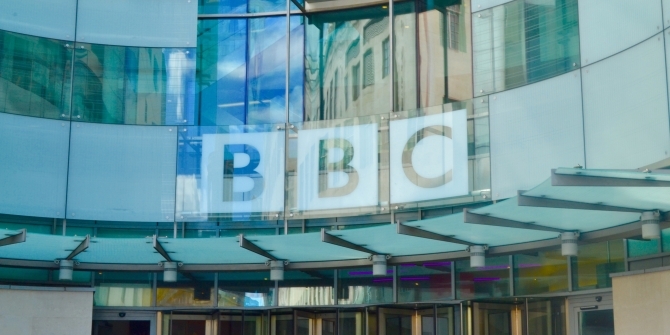 Philip Schlesinger, Professor in Cultural Policy at the University of Glasgow and Visiting Professor in the Department of Media and Communication at the LSE, argues that proper attention has not yet been paid to broadcasting under an independent Scotland, but regardless of whether the vote is a yes or no the time is ripe for Scotland to lobby for some change.
Philip Schlesinger, Professor in Cultural Policy at the University of Glasgow and Visiting Professor in the Department of Media and Communication at the LSE, argues that proper attention has not yet been paid to broadcasting under an independent Scotland, but regardless of whether the vote is a yes or no the time is ripe for Scotland to lobby for some change.
If Scots vote for independence on 18 September, the battle lines for negotiating the future of the BBC have been well advertised.
The SNP would seek to set up a Scottish Broadcasting Service (SBS) based on the staff and assets of BBC Scotland. The SBS would aim to establish a joint venture with the BBC, ensure the corporation’s output could be accessed north of the border, and substantially raise the amount of Scottish content produced.
Surprisingly, there has been little serious debate about broadcasting or indeed the wider communications agenda. A flurry occurred late last month when, seemingly in concert, Lord Birt, a former BBC director-general, and the Shadow Scottish Secretary, Margaret Curran, both said that the SNP’s vision was unrealizable. Birt, with past form as director-general in rejecting even modest devolutionary concessions such as a Scottish Six O’Clock TV News – which became a brief cause célèbre in Scotland back in 1998 – sees independence as crippling future BBC finance while also making Scots pay much more for the corporation’s services. His recent broadside added nothing new to arguments now long in play.
Ms Curran, a leading politician, is apparently bereft of constructive ideas about how, in the event, the BBC might adapt to enhanced devolution – widely known in Scotland as ‘devo-max’ – similarly played the devastation card.
Hers is a more serious failure of imagination. What do unionists propose if Scots vote no to independence? If there are any answers, these are being kept firmly under wraps. Broadcasting has been totally absent from the London parties’ new improved devolution offers, leaving an open target for the SNP, should it have to fight this ground again.
But the unionists really will need to have some ideas if it’s a no, as some of the SNP’s Plan B for broadcasting is already plain, and the dynamic of devo-max – should it come – is not likely to leave broadcasting out of the equation.
Sounding a quite different note, Scottish Culture Secretary Fiona Hyslop has said that she wants the indie sector in an independent Scotland to produce much more, with 4,000 hours to be commissioned from 2017, giving Scottish viewers ‘more content about and for Scotland’. If this were intended to be high-quality production, it would surely be a big ask for a small country, even backed by Ms Hyslop’s mooted development fund to steer equity into film and TV production.
But what if significantly upping Scottish indies’ production hours were to become a bargaining chip under devo-max? There is great potential for friction with the BBC’s out-of-London production target, now set at 17 percent from all the nations in 2017. And the quota system presently regulated by Ofcom for the public service commercial broadcasters – Channels 3, 4 and 5 – would also come under pressure.
Behind the present rules of the game for production stands the UK’s system of broadcasting and communications regulation. While we cannot foresee precisely how any independence negotiations would work out, they would certainly significantly redefine the present British regulatory system or, at the extreme, exit completely from it. But in the event of a yes, we should not exclude the possibility of some buy-in into communications regulation, if that were to be agreed with the rUK government. We know the broad shape, as last year, in a straw in the wind report, Finance Secretary John Swinney proposed new economic and competition regulation that encompassed aspects of communications.
In line with this, the Scottish Government’s White Paper (the blueprint for independence negotiations) has pointed to possible co-regulation with Ofcom, another version of the joint venture idea mooted for the BBC.
If it is a no on 18 September, would these ideas simply disappear? That is hardly likely. The BBC is gearing up for the next Charter Review in 2016, a good time for lobbying for the Scottish interest. The SNP’s nascent Plan B would doubtless raise questions about the corporation’s formal accountability to the Scottish Parliament as well as the adequacy of Scottish representation on the BBC Trust and Ofcom’s board, much in tune with the call for more devolved broadcasting governance made earlier this year by the Silk Commission in Wales.
No-one has given proper attention to broadcasting and devo-max in Scotland because the polarized debate has simply excluded this possibility until the unionist parties put devo-max back on the agenda
Yes or no, things are not going to stand still.
This article gives the views of the author and does not represent the position of the LSE Media Policy Project blog, nor of the London School of Economics.




